Strictly On The Record
| Strictly On The Record |
|
Summer Suggestions: 2001 |
| Igor Kipnis |
| 27 June 2001 |
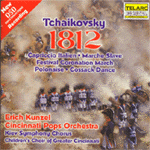 Thinking of July 4th, the most obvious summer blockbuster among the usual plethora of classical releases over the last few months is an all-Tchaikovsky, Erich Kunzel/Cincinnati Pops Orchestra compilation that includes the ubiquitous 1812 Overture, Capriccio Italien, Marche Slav, Festival Coronation March, and orchestral excerpts from Eugen Onegin and Mazeppa (Telarc CD-80541). Everything is very well performed, if not perhaps with the ultimate in excitement and vitality. The 1812, as has become customary, here includes a chorus from Kiev, a children’s choir from Cincinnati, and, far from least, cannons, all these taken from a variety of different venues and cleverly multed together in a most convincing way. Although I had expected them, the cannons actually cause me to jump up slightly, so convincing was the explosive effect, reminding me of nothing so much as my basic training days in the Fifth Armored Division during the Korean War. The sound, needless to add at this point, is little short of spectacular with much beautifully clear orchestral detail on my Direct Stream Digital copy. The booklet warns of possible speaker damage, and the playback level consequently is far lower than usual. The only disappointment was the very bottom bass response, which, although perfectly satisfactory, did not for me and my equipment seem to recreate the guts of the lower percussions and string basses. It needs to be mentioned that this production, available in the above-mentioned normal CD version, is also duplicated in a SACD hybrid music carrier version, a different format which can be played on a regular CD player with conventional 16 bit/44.1 kHz, as well as in an SACD player, giving one the possibility of either two-channel single-bit Sony Super Audio CD or a six channel, single-bit recording, providing your SACD player plays back more than two channels.
Thinking of July 4th, the most obvious summer blockbuster among the usual plethora of classical releases over the last few months is an all-Tchaikovsky, Erich Kunzel/Cincinnati Pops Orchestra compilation that includes the ubiquitous 1812 Overture, Capriccio Italien, Marche Slav, Festival Coronation March, and orchestral excerpts from Eugen Onegin and Mazeppa (Telarc CD-80541). Everything is very well performed, if not perhaps with the ultimate in excitement and vitality. The 1812, as has become customary, here includes a chorus from Kiev, a children’s choir from Cincinnati, and, far from least, cannons, all these taken from a variety of different venues and cleverly multed together in a most convincing way. Although I had expected them, the cannons actually cause me to jump up slightly, so convincing was the explosive effect, reminding me of nothing so much as my basic training days in the Fifth Armored Division during the Korean War. The sound, needless to add at this point, is little short of spectacular with much beautifully clear orchestral detail on my Direct Stream Digital copy. The booklet warns of possible speaker damage, and the playback level consequently is far lower than usual. The only disappointment was the very bottom bass response, which, although perfectly satisfactory, did not for me and my equipment seem to recreate the guts of the lower percussions and string basses. It needs to be mentioned that this production, available in the above-mentioned normal CD version, is also duplicated in a SACD hybrid music carrier version, a different format which can be played on a regular CD player with conventional 16 bit/44.1 kHz, as well as in an SACD player, giving one the possibility of either two-channel single-bit Sony Super Audio CD or a six channel, single-bit recording, providing your SACD player plays back more than two channels.
Much as I enjoyed the Tchaikovsky viscerally in the normal CD version, I would opt as an orchestral standout for a marvelously exciting Stravinsky Fire Bird ballet (coupled with the Symphonies of Wind Instruments) performed by the London Symphony Orchestra under the American conductor, Kent Nagano (Virgin Classics 61848). Keep your eye on him; he’s going to wind up with one of the big American orchestras. This Firebird is sensational, both as a wonderfully colorful and detailed exposition of this score but also has an example of CD sonics at their best, and this time the bass department is not slighted. Try the “Katchei’s Infernal Dance” at track 20. That will set your speakers to working. The CD is definitely of demonstration quality.
Chandos in England has released the popular London Symphony of Ralph Vaughan Williams (CHAN 9902) in a performance by the London Symphony under Richard Hickox. There is a difference between this and all other recordings, however, in that the producers has been allowed to use the original 1913 rather than the standard 1933 revision, the latter being what conductors such as Barbirolli, Boult, and Previn, among others, used. The difference is an added twenty minutes, the later versions sounding slightly more tightly organized, but this premier is not without interest, especially when so well played as here. The filler is the slightly earlier George Butterworth’s bucolic idyll, The Banks of Green Willow.
Dalia Atlas, a superb Israeli conductor of whom more audiences should be aware, has recorded a number of works by Ernest Bloch (1880-1959), including, most recently his well-known and often recorded mid-twenties Concerto Grosso No. 1, which is here coupled with the later No. 2 (ASV DCA 1055). Ms. Atlas’s string orchestration of the first two movements from Bloch’s 1916 first string quartet provides a strong conclusion with her own ensemble, the Atlas Camerata. Everything here is played with both dynamic vigor and appropriate lyricism.
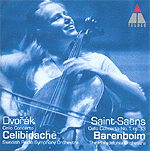 Historical recordings continue to attract attention and provide some of the most interesting fare for the musical lover, if not always for the audiophile. Teldec has issued, respectively, 1967 and 1971 live performances of Jacqueline Du Pré performing the Dvorak Cello Concerto with Sergie Celibidache and the Swedish Radio Symphony and Saint-Saëns’ first concerto with Daniel Barenboim and the Philadelphia (85340). The latter, played virtually at the end of her curtailed career, is a thrilling performance, full of vitality and conviction, both stormy and lyric as the music warrants, and the Dvorak has an irresistible intensity (Teldec 85340).
Historical recordings continue to attract attention and provide some of the most interesting fare for the musical lover, if not always for the audiophile. Teldec has issued, respectively, 1967 and 1971 live performances of Jacqueline Du Pré performing the Dvorak Cello Concerto with Sergie Celibidache and the Swedish Radio Symphony and Saint-Saëns’ first concerto with Daniel Barenboim and the Philadelphia (85340). The latter, played virtually at the end of her curtailed career, is a thrilling performance, full of vitality and conviction, both stormy and lyric as the music warrants, and the Dvorak has an irresistible intensity (Teldec 85340).
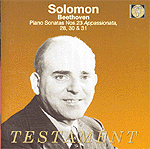 Turning to keyboard, I must recommend a recently reissued set of recordings by the late British pianist, Solomon (1902-1988), one of the most patrician of players, who began his career as a prodigy, displayed a great virtuoso technique in his early years, and, in his late ones, turned into a paragon among classically minded interpreters. I am often asked to suggest those I might consider among the best of the complete recordings of the thirty-two sonatas, and I always include Solomon (his last name was Cutner, incidentally), albeit a debilitating stroke in 1956 prevented him from recording more than eighteen of them (Testament SBT 1189-92, five CDs). The sonics, in which one cannot help but admire Solomon’s gorgeously warm tone, originally date from 1951-56, and listeners should be aware there is tape and disc hiss, not so obtrusive, however, that it cannot be overlooked. I still find these among the most satisfying of Beethoven performances.
Turning to keyboard, I must recommend a recently reissued set of recordings by the late British pianist, Solomon (1902-1988), one of the most patrician of players, who began his career as a prodigy, displayed a great virtuoso technique in his early years, and, in his late ones, turned into a paragon among classically minded interpreters. I am often asked to suggest those I might consider among the best of the complete recordings of the thirty-two sonatas, and I always include Solomon (his last name was Cutner, incidentally), albeit a debilitating stroke in 1956 prevented him from recording more than eighteen of them (Testament SBT 1189-92, five CDs). The sonics, in which one cannot help but admire Solomon’s gorgeously warm tone, originally date from 1951-56, and listeners should be aware there is tape and disc hiss, not so obtrusive, however, that it cannot be overlooked. I still find these among the most satisfying of Beethoven performances.
Strictly in orchestral form is the only way, one would think, of listening to Holst’s popular The Planets, not to mention Stravinsky’s colorful Rite of Spring. Yet piano, four hand adaptations, popular since the 19th Century, provided not only a way to become familiar with the scores at home but also clarified the sometimes intricate textures of the orchestral version for both players and listeners who wanted to study the score. What is billed as a world premier recording, a one-piano, four-hand arrangement of the Holst, is presented by British duo-pianists Fiona and John York (Black Box BBM 1041), the adaptation having been done at Holst’s suggestion by his friends, Vally Lasker and Nora Day. Though one may, of course, miss the sustaining power of the orchestral strings, the York2 (as the duo is called) displays beautifully integrated playing and an ensemble excitement that is never less that one hears in the full score (try Mercury or Jupiter). Their brilliance does not disintegrate into clatter either. The well-recorded disc is filled out with six brief and highly interesting piano solos by Holst, but Black Box has failed to provide information as to who is doing the solo playing.
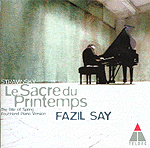 The second surprise is better known: Stravinsky’s own one-piano, four-hand version of Le Sacre, which was used for rehearsing the original ballet back in 1913. This had been recorded before, notably by Michael Tilson Thomas and Ralph Grierson for Angel, as well as others, but the present recording by the Turkish pianist, Fazil Say (pronounced sigh), in effect “orchestrates” the work for the piano, both normal and prepared (creating unusual sounds), using a computer-controlled Bösendorfer, multi-tracking, superimposition, and synchronization (Teldec 81041). The result has extraordinary clarity, rather less for the sake of color than for the explicating the different difficult rhythms and intricate textures. The CD, incidentally, also doubles as a CD-ROM (Mac/PC) with Say playing Stravinsky, Gershwin, and Bach for some five minutes of ostentatiously artsy video. I reviewed his first disc of Mozart for International Piano Quarterly a few years ago, found it not at all to my liking because of the pianist’s finagling with and supplementing Mozart’s own score directions, something he also did but to a lesser extent in his more recent Gershwin solo and orchestral program with Kurt Mazur. But make no mistake. Say is an extraordinary keyboardist, and his Stravinsky, unusual and provocative, may intrigue listeners The piano sound, however, I find realistically percussive but, upon repeated hearing, not so much of a pleasure to the ear as the orchestral version.
The second surprise is better known: Stravinsky’s own one-piano, four-hand version of Le Sacre, which was used for rehearsing the original ballet back in 1913. This had been recorded before, notably by Michael Tilson Thomas and Ralph Grierson for Angel, as well as others, but the present recording by the Turkish pianist, Fazil Say (pronounced sigh), in effect “orchestrates” the work for the piano, both normal and prepared (creating unusual sounds), using a computer-controlled Bösendorfer, multi-tracking, superimposition, and synchronization (Teldec 81041). The result has extraordinary clarity, rather less for the sake of color than for the explicating the different difficult rhythms and intricate textures. The CD, incidentally, also doubles as a CD-ROM (Mac/PC) with Say playing Stravinsky, Gershwin, and Bach for some five minutes of ostentatiously artsy video. I reviewed his first disc of Mozart for International Piano Quarterly a few years ago, found it not at all to my liking because of the pianist’s finagling with and supplementing Mozart’s own score directions, something he also did but to a lesser extent in his more recent Gershwin solo and orchestral program with Kurt Mazur. But make no mistake. Say is an extraordinary keyboardist, and his Stravinsky, unusual and provocative, may intrigue listeners The piano sound, however, I find realistically percussive but, upon repeated hearing, not so much of a pleasure to the ear as the orchestral version.
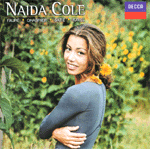 As to performances with only two hands on one keyboard, there are two recent CDs which are recommendable for their different qualities. Exhilarating playing by the young Canadian pianist, Naida Cole, of late 19th and early 20th Century works by Fauré (the Ballade in its solo piano version), Chabrier (three Pièces pittoresques), Satie (the familiar first Gymnopédie), and Ravel (Jeux d’eau, Pavane, and Gaspard de la nuit) (Decca 748021). This young woman with most impressive credentials (she studied with Fleisher and Bashkirov, among others) is not always the most elegant of Francophiles, in comparison, say, with Rubinstein, but her brilliant pianism and obviously extrovertish style, coupled with the widest dynamic palette, makes her an interesting performer on which to keep an eye. Good piano sound, if not up to the one mentioned below.
As to performances with only two hands on one keyboard, there are two recent CDs which are recommendable for their different qualities. Exhilarating playing by the young Canadian pianist, Naida Cole, of late 19th and early 20th Century works by Fauré (the Ballade in its solo piano version), Chabrier (three Pièces pittoresques), Satie (the familiar first Gymnopédie), and Ravel (Jeux d’eau, Pavane, and Gaspard de la nuit) (Decca 748021). This young woman with most impressive credentials (she studied with Fleisher and Bashkirov, among others) is not always the most elegant of Francophiles, in comparison, say, with Rubinstein, but her brilliant pianism and obviously extrovertish style, coupled with the widest dynamic palette, makes her an interesting performer on which to keep an eye. Good piano sound, if not up to the one mentioned below.
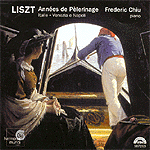 Frederic Chiu, born in Ithaca in 1964 and now already performing internationally, has traversed a wide range of composers, from recordings of the complete piano music of Prokofiev through Mendelssohn, Chopin, Schubert-Liszt, Rossini, to his latest CD of the Second Book, Italy, of Liszt’s Années de Pèlerinage, the one that contains, among other well-known travelogue pieces, the Venetian Gondoliera, the three Petrarch Sonnets, and the Dante Sonata (Harmonia Mundi HMU 907263) In past recordings, I had previously been under the rather erroneous impression that this young performer, a former student of Karen Shaw at Indiana University and Abbey Simon at Juilliard and now living in Paris, was an objective and essentially intellectual player rather than a subjective interpreter. His Liszt, large-scale, reflective, sonorous, excitingly Dionysian (but never self-indulgent), and, above all, fantastically virtuosic in tone and poetic temperament, is an absolutely amazing document, one of the best recordings of this variegated and pianistically difficult Italian musical journey I have ever heard. Chiu’s Yamaha, beautifully recorded in an airy but not cavernous ambiance at Skywalker Sound in Nicasio, California, rather like a small concert hall, is extremely realistic and satisfying.
Frederic Chiu, born in Ithaca in 1964 and now already performing internationally, has traversed a wide range of composers, from recordings of the complete piano music of Prokofiev through Mendelssohn, Chopin, Schubert-Liszt, Rossini, to his latest CD of the Second Book, Italy, of Liszt’s Années de Pèlerinage, the one that contains, among other well-known travelogue pieces, the Venetian Gondoliera, the three Petrarch Sonnets, and the Dante Sonata (Harmonia Mundi HMU 907263) In past recordings, I had previously been under the rather erroneous impression that this young performer, a former student of Karen Shaw at Indiana University and Abbey Simon at Juilliard and now living in Paris, was an objective and essentially intellectual player rather than a subjective interpreter. His Liszt, large-scale, reflective, sonorous, excitingly Dionysian (but never self-indulgent), and, above all, fantastically virtuosic in tone and poetic temperament, is an absolutely amazing document, one of the best recordings of this variegated and pianistically difficult Italian musical journey I have ever heard. Chiu’s Yamaha, beautifully recorded in an airy but not cavernous ambiance at Skywalker Sound in Nicasio, California, rather like a small concert hall, is extremely realistic and satisfying.
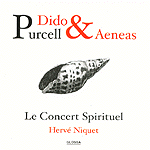 Those that know Henry Purcell’s 1689 mini-opera, Dido and Aeneas, would not hesitate to name the fifty-five minute work as one of the gems of the entire Baroque. Recordings of the tale of the Carthage queen and the Trojan lover who abandoned her in order to found Rome have been plentiful, including a legendary and still available 1952 performance with Kirsten Flagstad, more recent modern-instrument ones including such an assemblage of conductors as Britten, Davis, Barbirolli, and Leppard. Period instrument ensembles include Tafelmusik, Boston Baroque, Pinnock, Parrott, Christie, Hogwood, Harnoncourt, and Gardiner, the latest one (Glossa GCD 921601) being conducted by Hervé Niquet with his twenty-four person ensemble (plus a thirteen member chorus), known as Le Concert Spirituel. There is nothing remotely spiritual, however, about his often dance-like performance which favors the fleet tempos typical of today’s baroque ensembles, as well as a strong feeling for drama and continuity in which one number often elides into the next. The affecting vocalists (including soprano Laura Pudwell, who effectively doubles as both Dido and the Sorceress) are excellent, and the whole performance, beautifully recorded, is one that can stand among the best available.
Those that know Henry Purcell’s 1689 mini-opera, Dido and Aeneas, would not hesitate to name the fifty-five minute work as one of the gems of the entire Baroque. Recordings of the tale of the Carthage queen and the Trojan lover who abandoned her in order to found Rome have been plentiful, including a legendary and still available 1952 performance with Kirsten Flagstad, more recent modern-instrument ones including such an assemblage of conductors as Britten, Davis, Barbirolli, and Leppard. Period instrument ensembles include Tafelmusik, Boston Baroque, Pinnock, Parrott, Christie, Hogwood, Harnoncourt, and Gardiner, the latest one (Glossa GCD 921601) being conducted by Hervé Niquet with his twenty-four person ensemble (plus a thirteen member chorus), known as Le Concert Spirituel. There is nothing remotely spiritual, however, about his often dance-like performance which favors the fleet tempos typical of today’s baroque ensembles, as well as a strong feeling for drama and continuity in which one number often elides into the next. The affecting vocalists (including soprano Laura Pudwell, who effectively doubles as both Dido and the Sorceress) are excellent, and the whole performance, beautifully recorded, is one that can stand among the best available.
Carlos Kleiber (b. 1930), perhaps the greatest conductor not appearing before the public today (his engagements have become ever increasingly rare) commercially recorded several operas, but some of his earlier, live performances have begun showing up among imports. That includes Die Fledermaus, which he conducted in Munich with the Bavarian State Opera on New Year’s Eve, 1975 (Melodram Connoisseur GM 6 0008). The cast was stellar, even better than his DGG recording: Gundula Janowitz, Carole Malone, Wolfgang Brendel, Eberhard Wächter, Waldemar Kmentt, and (as a super Prince Orlovsky), Brigitte Fassbaender. If all that, plus Kleiber’s scintillating champagne-like performance whets your appetite, please be warned that the mono sound is pretty execrable with a good bit of intermodulation distortion. Still, it may be a desirable item for the Kleiber collector (if you don’t have his great Beethoven symphonies 5 and 7 on DGG, you are missing something).
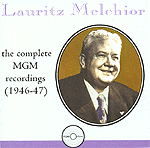 Finally, an older generation of operatic fans will recall the renowned Danish Wagnerian tenor, Lauritz Melchior (1890-1973) not only as the greatest heldentenor of his time (perhaps all time) but as a most genial paterfamilias in a number of MGM films of the late 1940s (Thrill of a Romance, Luxury Liner, et al). During the later period, he recorded some 27 mostly popular tunes for MGM, “The Song is You” “I Love You Truly,” “Without a Song” “For You Alone,” “Ave Maria,” “Silent Night,” and so forth (Romophone 82019). Hearing the great voice again, even in this lighter repertoire, is almost as much a thrill as listening to his many reissued Wagner discs of the 1930s on such labels as Preiser, and Mark Obert-Thorn’s restoration make the most of what originally was a close-up, tightly microphoned setting.
Finally, an older generation of operatic fans will recall the renowned Danish Wagnerian tenor, Lauritz Melchior (1890-1973) not only as the greatest heldentenor of his time (perhaps all time) but as a most genial paterfamilias in a number of MGM films of the late 1940s (Thrill of a Romance, Luxury Liner, et al). During the later period, he recorded some 27 mostly popular tunes for MGM, “The Song is You” “I Love You Truly,” “Without a Song” “For You Alone,” “Ave Maria,” “Silent Night,” and so forth (Romophone 82019). Hearing the great voice again, even in this lighter repertoire, is almost as much a thrill as listening to his many reissued Wagner discs of the 1930s on such labels as Preiser, and Mark Obert-Thorn’s restoration make the most of what originally was a close-up, tightly microphoned setting.
![]()
Don’t forget to bookmark us! (CTRL-D)
Stereo Times Masthead
Publisher/Founder
Clement Perry
Editor
Dave Thomas
Senior Editors
Frank Alles, Mike Girardi, Russell Lichter, Terry London, Moreno Mitchell, Paul Szabady, Bill Wells, Mike Wright, and Stephen Yan,
Current Contributors
David Abramson, Tim Barrall, Dave Allison, Ron Cook, Lewis Dardick, John Hoffman, Dan Secula, Don Shaulis, Greg Simmons, Eric Teh, Greg Voth, Richard Willie, Ed Van Winkle, Rob Dockery, Richard Doron, and Daveed Turek
Site Management Clement Perry
Ad Designer: Martin Perry



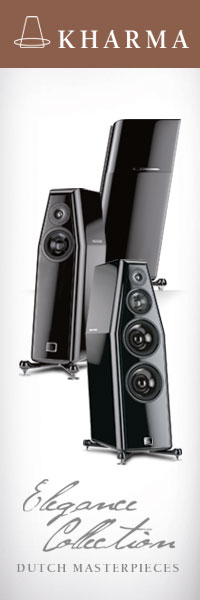
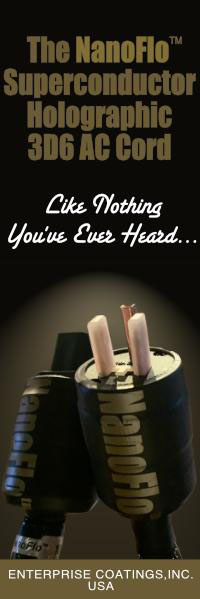
Be the first to comment on: Strictly On The Record